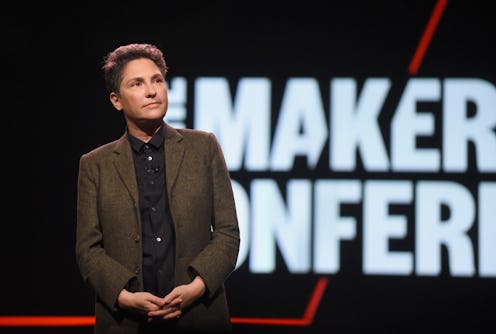
I know, I know. You're already furrowing your brow and you're 99 percent certain that the headline above is clickbait. But believe it: The idea that there is actually something good coming out of Trump's presidency is legit. But I was skeptical at first, too. Luckily, Transparent creator Jill Soloway set me straight when I spoke to her at the 2017 Sundance Film Festival, where she was promoting her new Amazon series, I Love Dick.
"We’ve been in this business of trying to figure out how to change the world for a while, pre-Trump," says Soloway, speaking about her organization, Topple (short for Topple the Patriarchy). "When we talked about our mission, it was as a company to [be the] intersectional and international feel-good power movement for the revolution, so we have long felt that the communities of people of color, women, and queer people need to come together under a particular banner that would allow for all of us to see that the ways that we are otherized by patriarchy actually should connect us."
"We’re able to actually come up with a combined movement and a voice that needed this kind of darkness to kind of really magnify and magnetize."
But that simple idea of connection has been complicated, inherently, because while many of these groups oppose Trump, not everyone is coming from the same place. Take, for example, the infighting leading up to the Women's March on Washington, which took place days before Soloway sat down with me. Articles peppered the web leading up to the march, including one by Bustle writer Char Adams, whose piece "What Every White Woman Attending The Women's March Needs To Know" made the huge point that "black women have long experienced what white women are now complaining about: feeling alienated."
"I do think that erasure is a huge problem and so I think people have been struggling with this and need to come together when people don’t really want to come together until they feel like they’ve been recognized for the ways they have particularly have suffered," Soloway says. "So that’s really important that that’s the way it’s been going, that women of color will say to white women, 'Hold on a second before we link arms with you. We want to make sure that you understand this, this, and this…' I think that’s a completely reasonable way to go, there’s nothing wrong with that idea. That’s a great idea."
But, the way Soloway sees it, post-march, is that the various social groups who came together during the march are finally starting to gel as one force of resistance because of President Trump.
Soloway says that, now, under Trump, we have "a common enemy" and thus, "We now are able to have these iterative, real-time conversations happening on the internet, on the whole planet, where we can plan together and we can go, 'Hey, look, when we poke the bear — Trump — he’s too busy to do laws. He’s too busy to actually f--k things up. So let’s keep poking him, because if he’s too busy saying Meryl Streep is a bad actress, he’s not actually having time to ruin Obamacare. ... We’re able to actually come up with a combined movement and a voice that needed this kind of darkness to kind of really magnify and magnetize."
And while that may be a slightly optimistic take on the climate (there are, admittedly, still sticking points among different groups within the resistance post-march), there is an element of reality to it. Now that the pussy hats have done their jobs, creating swaths of girl power pink in the multitudes of Instagrams and photographs of the millions of marchers in more than 550 cities, we're approaching the real test. Will we continue to support each others' causes beyond the perfect Instagram opportunity of the Women's March? Will we all show up for more specific movements — for trans rights and Black Lives Matter? If Soloway is correct, we will because Trump's agenda is a strong enough force to unite us all, and that sort of resistance — if we can allow it to manifest — would truly be something to celebrate.